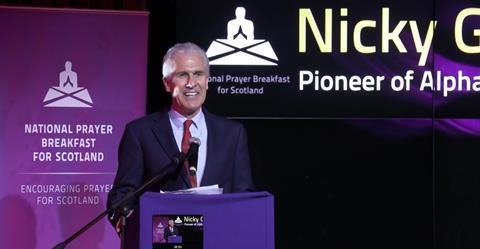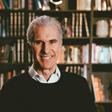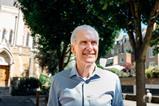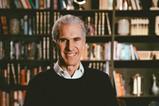The past few years have thrown so many challenges at us, says Nicky Gumbel. Jesus’ vision, love for others, relationships and model of empowerment show us how we can bend and not break. Here’s his sermon from the National Prayer Breakfast for Scotland in full

I’m delighted to be here in Scotland. I had the privilege yesterday of doing the reflection in the Scottish Parliament and, as I am sure some of you will know, if you do that, you have to submit it in advance so that there’s nothing too contentious in it.
I submitted my 400 words and the only thing they changed - on reflection, quite rightly - was my opening joke. Because what I wanted to say, and I’ll say it here, is that I can’t claim to be 100 per cent Scottish, but I can claim the next best thing: I have no English blood in me. They quite rightly edited that out because they thought it might appear anti-English. But on this occasion, I have the opportunity (which I didn’t have there) to explain: it’s a joke. I love Scottish people. I love the English. I love the French. I love the Chinese; I love everyone!
Everyone’s looking for love, everyone’s looking for purpose and everyone’s looking to belong
My mother came from Pittenweem (a small village in Scotland). She told me, when my sister and I were about 14, that my father was German and Jewish, and that I was never to speak to him about it. I never did. More recently, a museum in Berlin contacted me and asked me what I knew about my family. I said: “Absolutely nothing. What do you know?” They sent me my family tree, and I discovered that my great grandfather was Moses, and my great great grandfather was Abraham. Not the Abraham, but Abraham. I also discovered the concentration camps in which many of my family had died, and I understood why my father couldn’t speak about it.
Changed forever
Aged 18, as an atheist at Cambridge University, I read the entire New Testament. And as I read, it was as if the person that I was reading about - the person of Jesus - emerged from the pages. I encountered him and that changed my life. I come from a family of lawyers. My father was a barrister; my mother was a barrister. I practiced as a barrister. My sister is a KC; my son and daughter both qualified as barristers; my grandfathers on both sides were barristers; my uncle was a barrister. If we’d had a cat, it would have been a barrister. So that was my background.
As a lawyer, I was fascinated, as I read the New Testament, to see how much evidence there is for the life, death and resurrection of Jesus. I read that “God so loved the world that he gave his one and only Son, that whoever believes in him shall not perish but have eternal life (John 3:16).
Everyone is looking for three things: everyone’s looking for love, everyone’s looking for purpose and everyone’s looking to belong. And I understood that the Son of God loved me and gave himself for me. I had an experience of God’s love through the Holy Spirit, I found purpose in a relationship with God, and I found the most wonderful belonging in the community of the Church of Jesus Christ. That was in 1974. And since then, I have had the joy of talking about this person, Jesus, who I have come to love.
Bend not break
Jesus, I believe, is the key to this whole subject of resilience. I’m no expert on resilience, but I had the privilege of listening to my wife, Pippa, speaking on resilience last night, and there is no one on the planet who is better qualified to talk about resilience than someone who’s been married to me for 45 years. I have no experience of resilience because I’ve been married to her! Apart from Jesus, I think she’s the only person on the planet born without original sin.
So I can’t speak with as much experience as her, but I discovered that Harvard Business School asked a CEO: “Out of everything, what do you wish you could test for in an interview?” He said that, over skill set or gifting, what he most wished he could test for was resilience. Because that is what makes the difference, not just over days, but over decades.
Resilience, from the Latin word resilire, means to rebound, recoil or spring back; not just to absorb pressure and be overwhelmed by it, but to absorb pressure and be able to spring back - to use pressure to your advantage. It’s like the difference between an oak tree and a palm tree. An oak tree looks strong, but has relatively shallow roots and is rigid. It can’t really flex, so if the wind is strong enough, it will break or blow over.
A palm tree doesn’t look that strong, but when it’s blown by the wind, it can bend parallel to the ground. Now, I don’t know about you, but that’s what we need when the wind blows. The palm tree can return to its place without breaking or blowing over. So resilience is not so much about how strong you look, but how much you can flex.
It’s been a very stormy few years. There have been high winds; lots of pressures. There’s been Covid, there’s been Ukraine, the cost of living crisis, mental health issues, waiting lists, fear, anxiety. Every leader, in faith and in politics, has had to face tough challenges. We all still bear some of the scars. Maybe you’ve lost a few branches. Maybe you’ve been tempted just to drop out. You might have felt a bit more like an oak tree than a palm tree.
The apostle Paul writes: “Let us not become weary in doing good, for at the proper time we will reap a harvest if we do not give up” (Galatians 6:9). The first thing to say is: If you’re still standing, you’re doing well. If you’re still in the fight, you’re doing well. Don’t become weary in doing good.
Lessons from Jesus
How do we build our resilience? I think one thing that unites us, as church ministers and politicians, is that we’re all ministers. And, as you know, that means we’re called to serve others. That’s what the word ‘minister’ means. There’s a reason you started on this path; a reason you’re willing to take all of the aggravation and hassle and criticism - because you wanted to serve.
And Jesus provides the model. Hebrews 12:1-3 tells us this: “let us run with perseverance the race marked out for us, fixing our eyes on Jesus, the pioneer and perfecter of faith. For the joy set before him he endured the cross, scorning its shame, and sat down at the right hand of the throne of God. Consider him who endured such opposition from sinners, so that you will not grow weary and lose heart.”
The word ‘resilience’ never appears in the whole Bible, but the equivalent is perseverance. In other words, the writer of Hebrews says that the secret of resilience is looking to Jesus, the model. He endured crucifixion, but he did not grow weary or lose heart.
So what can we learn from the model of Jesus?
1. Vision
Jesus had a very clear vision.
Helen Keller who, as you know, was blind and deaf and winner of the Nobel Peace Prize, said: “The only thing worse than being blind is having sight and no vision. Action without vision is a nightmare. And vision without action is merely a dream. But vision and action combined, can change the world.”
Jesus had vision. He looked out and he saw the urgent need – “they were harassed” (Matthew 9:36). That word means ‘weary’; it’s the same word. As we look around us at our society, people are confused, exhausted, weary, helpless. The word there means ‘thrown away, aimless, without purpose or direction’.
Resilience is not so much about how strong you look, but how much you can flex
We can see this in our society; there is so much need. A recent study among Zoomers found that 73 per cent of Gen Z feel alone. People aged between 12 and 30 are the loneliest generation, because they come from a culture more focused on strengthening our Wi Fi connection than strengthening our personal connections. And as Jesus looked out at these needs, he had a vision. And his vision was to transform society.
I know that every one of you are here because you to have a vision; to make a difference, to transform our society. That’s the first thing we can learn from Jesus: vision.
2. Love
“When he saw the crowds, he had compassion on them” (Matthew 9:36). And the word for compassion – it is only used of Jesus in the New Testament, and it’s the strongest word in the Greek language - it comes from the Greek word splanchnon, which means bowels.
It means he was deeply moved, emotionally, by seeing the needs of the people; by love and compassion. That’s what drove him to make a difference. And where did that love come from? It came from knowing that he was loved. This is the most important thing: to know that you are loved. Every one of you here is loved by God. St Paul wrote: “the Son of God loved me and gave himself for me” (see Galatians 2:20). Paul writes: “God’s love has been poured out into our hearts through the Holy Spirit” (Romans 5:5).
That’s what changed my life - experience of God’s love; knowing that I was loved by God. And therefore, inevitably, we have to love everyone. Jesus gives us the model of looking outwards. Pope Francis said that the Church that is self-referential becomes sick. We know that’s true of individuals; people who are self-obsessed, we don’t want to be around them.
The definition of sin - St Augustine and Luther talked about “homo incurvatus in se” - human beings curved in on themselves. That’s not attractive in an individual. It’s not attractive in a nation. It’s not attractive in the Church. We are to be outward focused, looking up to God and looking out; to serve, to love, to make a difference in this world. That’s what brings resilience: vision and love. When we’re not focused on ourselves, but we’re focused on other people.
3. Relationships
Jesus said: “Ask the Lord of the harvest” (Matthew 9:38). Pray! Pray to God. You have a relationship - you can pray to God. This is an amazing thing. We can have a relationship with God. It was a relationship with God that changed my life. Relationships are so important.
If you want to build your resilience, reconnect with your passion
We need relationships, first of all with God, and that’s why prayer is so important for us. Ever since 1974, I have read the Bible practically every day, because I want to hear from God, because I love him. But I also need people around me. What has helped me through the pandemic, and all the challenges of life, is my friends, the people that I can be in relationship with.
Relationships are so important. That’s why the Church is so important. It’s an amazing group of friends. That’s what it is. Jesus said: “I have called you friends” (John 15:15). It’s been amazing to watch, during the pandemic, how the Church reached out in relationship - not just the Church, but the faith communities.
One of the things that brought together the faith communities was working to feed the hungry - because we share a love for God and a care about other people. So that’s the third thing: relationships. These are the things that help us with resilience: vision, love, relationships.
4. Empowerment
Jesus said: “Ask the Lord of the harvest, therefore, to send out workers into his harvest field” (Matthew 9:38). We can’t do it on our own, we need one another. Jesus had a group around him and then he empowered others. He sent out others. The vision of Jesus was achieved. Of course, he was the one who started it, but he raised up a group around him and then he empowered people. And now he’s empowering 2.5bn people around the world to follow Jesus.
We can’t do it on our own. We need these four things that Jesus showed us, I think, above the many other things that will give us resilience.
Reconnecting with resilience
What is your passion? Your passion is what you are prepared to suffer for. It’s what the word ‘passion’ means.
If you want to build your resilience, reconnect with your passion.
What is the harvest that you long to see? The Galatians wanted to see people encounter Jesus. That’s what Paul lived for, too - because they found in him the greatest love, the greatest beauty, the greatest example of sacrifice and service the world has ever seen.
Jesus didn’t just live it, he died it. The more clearly you see him, the deeper your roots will go. The better you will be able to withstand the challenges that come.
Don’t give up. Do not become weary in doing good for, at the proper time, you will reap a harvest if you do not give up.
Amen.





































No comments yet